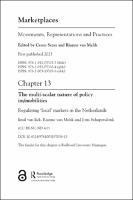Chapter 13 The multi-scalar nature of policy im/mobilities
Proposal review
Regulating ‘local’ markets in the Netherlands
Author(s)
van Eck, Emil
van Melik, Rianne
Schapendonk, Joris
Language
EnglishAbstract
The widely articulated death of public space in the early 1990s marked the beginning of an extensive interdisciplinary debate on public spaces in general and marketplaces in particular, discussing their social characteristics, political conduct and trends towards privatisation. While these studies describe the context of diversity and mobility as inherently translocal, they, somewhat paradoxically, tend to approach the reigning ‘relations of ruling’ in public spaces as merely local and equate them with municipal agendas of retail reinvestments and commercial gentrification strategies. Yet, as marketplaces come into daily existence through the everyday socio-economic practices of ambulant traders who connect a plurality of places, so are these translocal activities influenced by a multi-scalar web of rules and regulations that go beyond the territorial boundaries of marketplaces. The aim of this chapter is to empirically investigate the linkages among marketplaces, organisations and translocal processes of administration and governance by looking at the effects of the 2006 EU-law “Services in the Internal Market Directive” (2006/123/EC) on the place-making capacities and mobility patterns of traders in the Netherlands. It shows that locally instantiated regulations that affect marketplaces are embedded in multi-faceted institutional webs consisting of supranational, national and local policy levels in which actors compete and collaborate over the production of public space.


 Download
Download